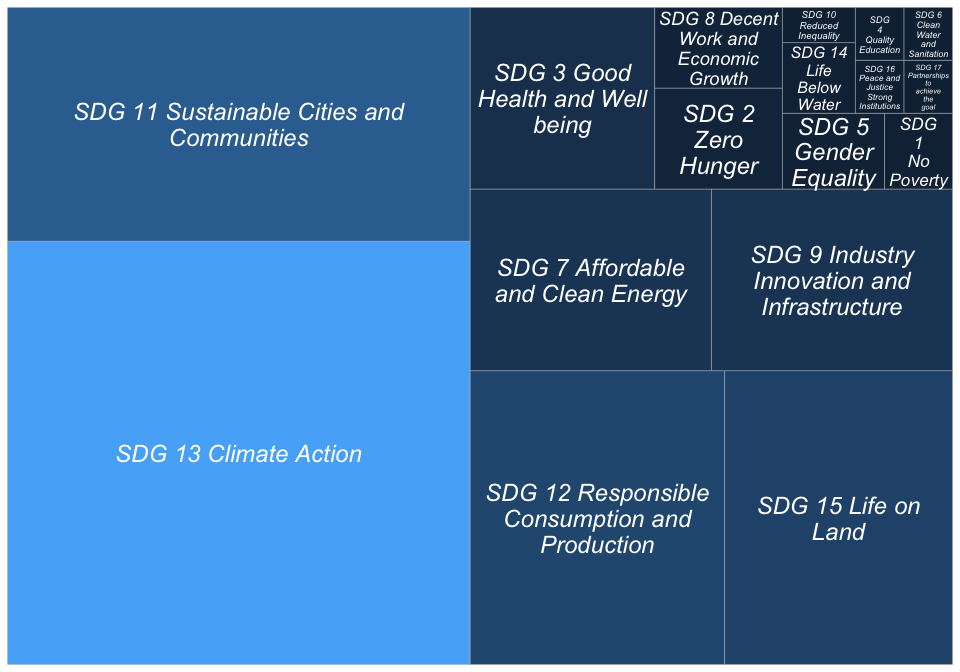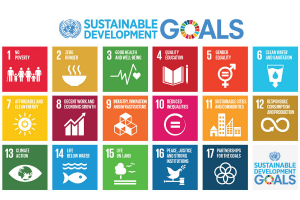Project Drawdown solutions meet many Sustainable Development Goals
Here we explore how Project Drawdown’s climate mitigation solutions relate to the 17 Sustainable Development Goals (SDGs). We find that Project Drawdown’s solutions can make a positive contribution to all SDGs, not just to Climate Action!
All United Nations (UN) countries are working towards achieving the Sustainable Development Goals (SDGs) by 2030. 169 targets and 232 unique indicators measure progress on the 17 SDGs.
Climate Action is one of these 17 SDGs that the world has agreed is of critical importance, and it is underpinned by the Paris Agreement. A separate initiative, Project Drawdown, has identified a range of actionable solutions to limit climate change (“Drawdown Solutions”), ranked via objective measures of CO2-equivalent reduction and costs.
We realised that most Drawdown Solutions provide extra sustainable development benefits, additional to climate action, which relate directly to many of the 17 SDGs. So we attempted to categorise which of Project Drawdown’s top 76 solutions related to which of the 17 SDGs.
This is timely as the UN Department of Economic and Social Affairs (UN DESA) and the UN Framework Convention on Climate Change (UNFCCC) have just published new analysis titled “Maximizing Co-benefits by Linking Implementation of the Sustainable Development Goals and Climate Action”.
The IPCC’s 2018 report on the impacts of global warming of 1.5 °C also provides an indepth analysis of the synergies and trade-offs of climate mitigation action across the SDGs, concluding that the total number of possible synergies exceeds the number of trade-offs. However, the IPCC 2018 report notes that the net effect of mitigation action on the SDGs will depend on how well they are implemented.
Snapshot of links between Project Drawdown Solutions and SDGs
The figure and tables below shows our rough assessment that the Drawdown Solutions can make a positive contribution to many of the 17 SDGs, not just to the Climate Action SDG!
While this analysis is not precise, the purpose is to provide a snapshot of the clear positive links between well described and measurable climate change mitigation solutions and the SDGs.
The size of each rectangle corresponds to the number of Drawdown Solutions that could help achieve the SDG. So the bigger the SDG rectangle, the more Drawdown Solutions that apply.

The data pertaining to the plot above
SDGs with more related Drawdown Solutions appear in columns towards the left:
Scroll over the table to navigate
| 13 Climate Action | 11 Sustainable Cities and Communities | 12 Responsible Consumption and Production | 15 Life on Land | 7 Affordable and Clean Energy | 9 Industry Innovation and Infrastructure | 3 Good Health and Well being | 2 Zero Hunger | 8 Decent Work and Economic Growth | 5 Gender Equality | 1 No Poverty | 14 Life Below Water | 10 Reduced Inequality | 16 Peace and Justice Strong Institutions | 17 Partnerships to achieve the goal | 4 Quality Education | 6 Clean Water and Sanitation |
|---|---|---|---|---|---|---|---|---|---|---|---|---|---|---|---|---|
| Refrigerant Management | Refrigerant Management | Refrigerant Management | Reduced Food Waste | Wind Turbines (Onshore) | Electric Vehicles | Reduced Food Waste | Reduced Food Waste | Educating Girls | Educating Girls | Educating Girls | Coastal Wetlands | Educating Girls | Educating Girls | Indigenous Peoples’ Land Management | Educating Girls | Tropical Forests |
| Wind Turbines (Onshore) | Wind Turbines (Onshore) | Wind Turbines (Onshore) | Plant-Rich Diet | Solar Farms | Methane Digesters (Large) | Plant-Rich Diet | Managed Grazing | Silvopasture | Family Planning | Family Planning | Nutrient Management | |||||
| Reduced Food Waste | Reduced Food Waste | Reduced Food Waste | Silvopasture | Rooftop Solar | Insulation | Tropical Forests | Improved Rice Cultivation | Women Smallholders | Women Smallholders | |||||||
| Plant-Rich Diet | Tropical Forests | Solar Farms | Regenerative Agriculture | Geothermal | Ships | Family Planning | System of Rice Intensification | Telepresence | ||||||||
| Tropical Forests | Solar Farms | Silvopasture | Temperate Forests | Nuclear | LED Lighting (Household) | Clean Cookstoves | Farmland Irrigation | |||||||||
| Educating Girls | Rooftop Solar | Rooftop Solar | Peatlands | Clean Cookstoves | Bamboo | Electric Vehicles | ||||||||||
| Family Planning | Geothermal | Regenerative Agriculture | Tropical Staple Trees | Wind Turbines (Offshore) | Alternative Cement | Mass Transit | ||||||||||
| Solar Farms | Nuclear | Tropical Staple Trees | Afforestation | Concentrated Solar | Trucks | Forest Protection | ||||||||||
| Silvopasture | Wind Turbines (Offshore) | Conservation Agriculture | Conservation Agriculture | Wave and Tidal | Airplanes | Indigenous Peoples’ Land Management | ||||||||||
| Rooftop Solar | Concentrated Solar | Tree Intercropping | Tree Intercropping | Methane Digesters (Large) | Building Automation | Walkable Cities | ||||||||||
| Regenerative Agriculture | Electric Vehicles | Geothermal | Managed Grazing | Biomass | Bioplastic | Bike Infrastructure | ||||||||||
| Temperate Forests | District Heating | Managed Grazing | Farmland Restoration | Solar Water | Cars | Electric Bikes | ||||||||||
| Peatlands | Insulation | Methane Digesters (Large) | Multistrata Agroforestry | In-Stream Hydro | Cogeneration | Green Roofs | ||||||||||
| Tropical Staple Trees | LED Lighting (Household) | Ships | Methane Digesters (Large) | Cogeneration | Smart Glass | |||||||||||
| Afforestation | Bamboo | Bamboo | Bamboo | Landfill Methane | High-speed Rail | |||||||||||
| Conservation Agriculture | Alternative Cement | Alternative Cement | Forest Protection | Methane Digesters (Small) | Water Distribution | |||||||||||
| Tree Intercropping | Mass Transit | Trucks | Indigenous Peoples’ Land Management | Micro Wind | Ridesharing | |||||||||||
| Geothermal | Trucks | Heat Pumps | Perennial Biomass | |||||||||||||
| Managed Grazing | Solar Water | Airplanes | Coastal Wetlands | |||||||||||||
| Nuclear | Heat Pumps | Water Saving - Home | System of Rice Intensification | |||||||||||||
| Clean Cookstoves | LED Lighting (Commercial) | Bioplastic | Composting | |||||||||||||
| Wind Turbines (Offshore) | Building Automation | Cars | Women Smallholders | |||||||||||||
| Farmland Restoration | Water Saving - Home | Household Recycling | Nutrient Management | |||||||||||||
| Improved Rice Cultivation | Bioplastic | Industrial Recycling | Farmland Irrigation | |||||||||||||
| Concentrated Solar | In-Stream Hydro | Composting | Recycled Paper | |||||||||||||
| Electric Vehicles | Cars | Nutrient Management | Biochar | |||||||||||||
| District Heating | Cogeneration | Recycled Paper | ||||||||||||||
| Multistrata Agroforestry | Walkable Cities | Water Distribution | ||||||||||||||
| Wave and Tidal | Household Recycling | Trains | ||||||||||||||
| Methane Digesters (Large) | Industrial Recycling | |||||||||||||||
| Insulation | Smart Thermostats | |||||||||||||||
| Ships | Bike Infrastructure | |||||||||||||||
| LED Lighting (Household) | Composting | |||||||||||||||
| Biomass | Smart Glass | |||||||||||||||
| Bamboo | Telepresence | |||||||||||||||
| Alternative Cement | High-speed Rail | |||||||||||||||
| Mass Transit | Electric Bikes | |||||||||||||||
| Forest Protection | Water Distribution | |||||||||||||||
| Indigenous Peoples’ Land Management | Green Roofs | |||||||||||||||
| Trucks | Trains | |||||||||||||||
| Solar Water | Ridesharing | |||||||||||||||
| Heat Pumps | Micro Wind | |||||||||||||||
| Airplanes | ||||||||||||||||
| LED Lighting (Commercial) | ||||||||||||||||
| Building Automation | ||||||||||||||||
| Water Saving - Home | ||||||||||||||||
| Bioplastic | ||||||||||||||||
| In-Stream Hydro | ||||||||||||||||
| Cars | ||||||||||||||||
| Cogeneration | ||||||||||||||||
| Perennial Biomass | ||||||||||||||||
| Coastal Wetlands | ||||||||||||||||
| System of Rice Intensification | ||||||||||||||||
| Walkable Cities | ||||||||||||||||
| Household Recycling | ||||||||||||||||
| Industrial Recycling | ||||||||||||||||
| Smart Thermostats | ||||||||||||||||
| Landfill Methane | ||||||||||||||||
| Bike Infrastructure | ||||||||||||||||
| Composting | ||||||||||||||||
| Smart Glass | ||||||||||||||||
| Women Smallholders | ||||||||||||||||
| Telepresence | ||||||||||||||||
| Methane Digesters (Small) | ||||||||||||||||
| Nutrient Management | ||||||||||||||||
| High-speed Rail | ||||||||||||||||
| Farmland Irrigation | ||||||||||||||||
| Waste-to-Energy | ||||||||||||||||
| Electric Bikes | ||||||||||||||||
| Recycled Paper | ||||||||||||||||
| Water Distribution | ||||||||||||||||
| Biochar | ||||||||||||||||
| Green Roofs | ||||||||||||||||
| Trains | ||||||||||||||||
| Ridesharing | ||||||||||||||||
| Micro Wind |
From the other perspective, which of the Drawdown Solutions relates to the most SDGs?
The table below shows our assessment that the Educating Girls and Reduced Food Waste Drawdown Solutions are related to the most SDGs, linking to at least 7 and 6 SDGs respectively:
- Educating Girls:
- Climate Action; Gender Equality; No Poverty; Decent Work and Economic Growth; Reduced Inequality; Quality Education; Peace and Justice and Strong Institutions.
- Reduced Food Waste:
- Climate Action; Zero Hunger; Good Health and Wellbeing; Sustainable Cities and Communities; Responsible Consumption and Production; Life on Land.
The table below shows our rudimentary assessment of the number of related SDGs for each of the 76 best Drawdown Solutions
Number of related SDGs for each of the 76 best Drawdown Solutions:
Scroll over the table to navigate
| Drawdown Solution | Number of related SDGs |
|---|---|
| Educating Girls | 7 |
| Reduced Food Waste | 6 |
| Bamboo | 5 |
| Methane Digesters (Large) | 5 |
| Alternative Cement | 4 |
| Bioplastic | 4 |
| Cars | 4 |
| Cogeneration | 4 |
| Composting | 4 |
| Electric Vehicles | 4 |
| Family Planning | 4 |
| Geothermal | 4 |
| Indigenous Peoples’ Land Management | 4 |
| Managed Grazing | 4 |
| Nutrient Management | 4 |
| Rooftop Solar | 4 |
| Silvopasture | 4 |
| Solar Farms | 4 |
| Tropical Forests | 4 |
| Trucks | 4 |
| Water Distribution | 4 |
| Wind Turbines (Onshore) | 4 |
| Women Smallholders | 4 |
| Airplanes | 3 |
| Bike Infrastructure | 3 |
| Building Automation | 3 |
| Clean Cookstoves | 3 |
| Coastal Wetlands | 3 |
| Concentrated Solar | 3 |
| Conservation Agriculture | 3 |
| Electric Bikes | 3 |
| Farmland Irrigation | 3 |
| Forest Protection | 3 |
| Green Roofs | 3 |
| Heat Pumps | 3 |
| High-speed Rail | 3 |
| Household Recycling | 3 |
| In-Stream Hydro | 3 |
| Industrial Recycling | 3 |
| Insulation | 3 |
| LED Lighting (Household) | 3 |
| Mass Transit | 3 |
| Micro Wind | 3 |
| Nuclear | 3 |
| Plant-Rich Diet | 3 |
| Recycled Paper | 3 |
| Refrigerant Management | 3 |
| Regenerative Agriculture | 3 |
| Ridesharing | 3 |
| Ships | 3 |
| Smart Glass | 3 |
| Solar Water | 3 |
| System of Rice Intensification | 3 |
| Telepresence | 3 |
| Trains | 3 |
| Tree Intercropping | 3 |
| Tropical Staple Trees | 3 |
| Walkable Cities | 3 |
| Water Saving - Home | 3 |
| Wind Turbines (Offshore) | 3 |
| Afforestation | 2 |
| Biochar | 2 |
| Biomass | 2 |
| District Heating | 2 |
| Farmland Restoration | 2 |
| Improved Rice Cultivation | 2 |
| Landfill Methane | 2 |
| LED Lighting (Commercial) | 2 |
| Methane Digesters (Small) | 2 |
| Multistrata Agroforestry | 2 |
| Peatlands | 2 |
| Perennial Biomass | 2 |
| Smart Thermostats | 2 |
| Temperate Forests | 2 |
| Wave and Tidal | 2 |
| Waste-to-Energy | 1 |
Open data and code from this analysis
We hope this post is interesting and thought provoking. If anybody would like to contribute further to it, here is the spreadsheet containing our rough analysis. Anyone can add comments/suggestions. We will receive an email notification when people comment. Also here is a repository with the code we used to produce everything else in this post (pull requests welcome).
Conclusions
Our rudimentary analysis shows that the Drawdown Solutions provide well described and measurable ways to address climate change while also contributing to a broad range of other SDGs and benefits.
This aligns with UN DESA and UNFCCC’s latest report on the synergies between and need for greater integration of global commitments to climate action and the SDGs.
We hope this is useful for governments, businesses, not-for-profits and others looking for direct ways to contribute towards the Sustainable Development Goals (SDGs).
By Amy Quinton and Daniel Newman

